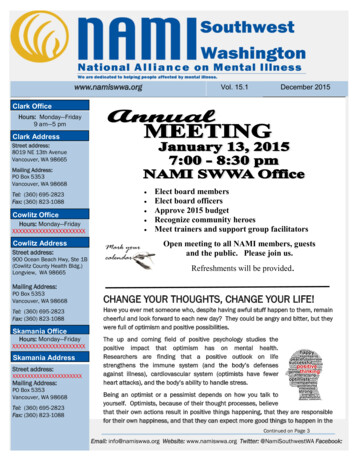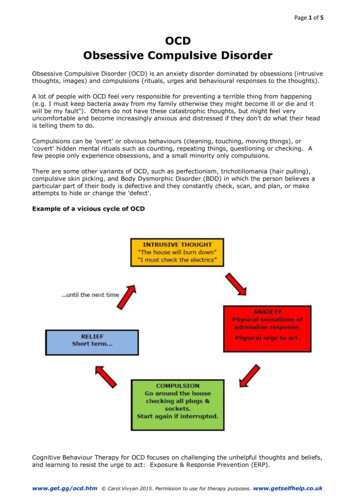
Transcription
www.namiswwa.orgVol. 15.1December 2015Clark OfficeHours: Monday—Friday9 am—5 pmClark AddressStreet address:8019 NE 13th AvenueVancouver, WA 98665Mailing Address:PO Box 5353Vancouver, WA 98668Tel: (360) 695-2823Fax: (360) 823-1088Cowlitz OfficeHours: Monday—FridayXXXXXXXXXXXXXXXXXXXXXXCowlitz AddressStreet address:900 Ocean Beach Hwy, Ste 1B(Cowlitz County Health Bldg.)Longview, WA 98665 Elect board membersElect board officersApprove 2015 budgetRecognize community heroesMeet trainers and support group facilitatorsOpen meeting to all NAMI members, guestsand the public. Please join us.Refreshments will be provided.Mailing Address:PO Box 5353Vancouver, WA 98668CHANGE YOUR THOUGHTS, CHANGE YOUR LIFE!Tel: (360) 695-2823Fax: (360) 823-1088Have you ever met someone who, despite having awful stuff happen to them, remaincheerful and look forward to each new day? They could be angry and bitter, but theywere full of optimism and positive possibilities.Skamania OfficeHours: Monday—FridayXXXXXXXXXXXXXXXXXXXXXXSkamania AddressStreet address:XXXXXXXXXXXXXXXXXXXXXXXMailing Address:PO Box 5353Vancouver, WA 98668Tel: (360) 695-2823Fax: (360) 823-1088The up and coming field of positive psychology studies thepositive impact that optimism has on mental health.Researchers are finding that a positive outlook on lifestrengthens the immune system (and the body’s defensesagainst illness), cardiovascular system (optimists have fewerheart attacks), and the body’s ability to handle stress.Being an optimist or a pessimist depends on how you talk toyourself. Optimists, because of their thought processes, believethat their own actions result in positive things happening, that they are responsiblefor their own happiness, and that they can expect more good things to happen in theContinued on Page 3Email: info@namiswwa.org Website: www.namiswwa.org Twitter: @NamiSouthwestWA Facebook:
National Alliance on Mental IllnessPage 2PresidentAnn Donnelly, Ph.D.boardpres@namiswwa.orgVice PresidentFrank F. cca Andersontreasurer@namiswwa.orgSecretaryMichael Altig, LMHCsecretary@namiswwa.orgBoard MembersScott BrickleyTed Engelbrecht, Rev, DrTerry GertsenAdam Herreid, MA, CMHCNancy JohnsonAdam PithanJoe Tran, RPhDarvin Zimmerman, Judgeboard@namiswwa.orgExecutive DirectorPeggy McCarthy, MBApeggy.mccarthy@namiswwa.orgFamily SpecialistLyn PattisonDevelopment DirectorSuzanne ArnitsCounselor/Advocate/EducatorDaryn Nelsen-SozaMental Health CounselorJanet Ragan, MA, LMHCPeer Benefits SpecialistCindy FalterSEE ME CoordinatorSandy FrischmanMSW InternEric ChastainOffice AssistantChelsea LawheadFrom the Directors Desk
County CoordinatorsClarkTerry GertsonCowlitzJanie GislasonSkamaniaBecky AndersonScott BrickleyVolunteer CoordinatorJason HarrisClass PreparationJeannie BaysNAMI Walks CoordinatorAngela RheingansSupport ServicesEric JohnsonOutreachSandy FrischmanBurgerville EventsWayne PattisonLibrary CoordinatorNancy MarshFamily Support GroupDon GreenwoodKay RobersonTeri RobinsonChris TibbitsConnectionSupport GroupEric JohnsonTeen Support GroupEric ChastainSTRivE Support GroupEric JohnsonDaryn NelsenLyn PattisonIlse SchuurmansJanine DeBackerCorrectionsH-Pod/WorkcenterEric JohnsonDaryn NelsenIlse SchuurmansJanine DeBackerNational Alliance on Mental IllnessPage 3:FOCUSING ON POSITIVE THINKINGYou can learn to turn negative thinking into positive thinking. The process issimple, but it does take time and practice. You are creating a new habit.Here are some ways to think and behave in a more positive and optimisticway:Identify areas to change. If you want to become more optimistic and engagein more positive thinking, first identify areas of your life that you typicallythink negatively about, whether it’s work, your daily commute or arelationship. You can start small by focusing on one area to approach in amore positive way.Check yourself. Periodically during the day, stop and evaluate what you’rethinking. If you find that your thoughts are mainly negative, try to find away to put a positive spin on them.Be open to humor. Give yourself permission to smile or laugh, especiallyduring difficult times. Seek humor in everyday happenings. When youlaugh at life you feel less stressed.Follow a healthy lifestyle. Exercise at least three times a week to positivelyaffect mood and reduce stress. Follow a healthy diet to fuel your mind andbody. And learn techniques to manage stress.Surround yourself with positive people. Make sure those in your life arepositive, supportive people you can depend on to give helpful advice andfeedback. Negative people may increase your stress level and make youdoubt your ability to manage stress in healthy ways.Practice positive self-talk. Start by following one simple rule: Don’t sayanything to yourself that you wouldn’t say to anyone else. Be gentle andencouraging with yourself. If a negative thought enters your mind,evaluate it rationally and respond with affirmations of what is good aboutyou.Change Your Thoughts, continued from Page 1future. Optimists don’t blame themselves when bad things happen. They view badevents as results of something outside of themselves.Pessimists think the opposite way, however. They blame themselves for the badthings that happen in their lives and think that one mistake means more willinevitable come. Pessimists see positive events as flukes that are outside of theircontrol – a lucky break that won’t happen again.You can change your thinking patterns over time and gain the benefits of positivethinking. Start by reframing how you define events, and analyze bad experiences tofigure out what good can come of them. Even if something is a failure, think aboutwhat you learned from that experience. Instead of blaming yourself for the failure,think about what outside influences affected the outcome, and what you can learnfrom the experience.Life is far too short to be miserable, so start cultivating a positive outlook which willin turn help improve your relationships and life experiences.
Page 4TOAST TO THE NEW YEAR- Author Unknown Let this coming year bebetter than all the others. Vow to do some of thethings you've alwayswanted to do but couldn'tfind the time. Call up a forgotten friend. Share a funny story withsomeone whose spirits aredragging. A good laugh canbe very good medicine. Make a genuine effort tostay in closer touch withfamily and good friends.The surest way to have afriend is to be one. Find the time to be kindand thoughtful. Give acompliment. It's sure togive someone a badlyneeded lift. Think things through. Forgive an injustice. Listen more. Be kind. Apologize when yourealize you are wrong. Anapology never diminishes aperson. It elevates him. Don't blow your ownhorn. If you've donesomething praiseworthy,someone will noticeeventually. Lighten up. When youfeel like blowing your top,ask yourself, "Will it matterin a week from today?" Laugh the loudest whenthe joke is on you. Be optimistic. The can-dospirit is the fuel that makesthings go. Don't abandon your oldfashioned principles. Theynever go out of style. When courage is needed,ask yourself, "If not me,who? If not now, when?" Walk tall, and smilemore. You'll look 10 yearsyounger. Don't be afraid to say, "Ilove you". Say it again.They are the sweetestwords in the world.And Have a Happy NewYear!National Alliance on Mental IllnessMEET THE BOARD—REBECCA (BECKY) ANDERSONBecky is NAMI SW WA’s Board Treasurer. She lives in Skamania County and workshard to represent all the residents in that county. She has played a key role in NAMI forthe past ten years after her two oldest grandchildren were taken from their biologicalparents. Their father was Becky’s son. The children were placed in foster care for aweek before we could be placed them with Becky’s daughter who offered to adoptthese children. During this transition time Becky took a family parenting class and other classes she felt would help her help her daughter to raise the children. When thetwo girls were just starting school we realized that they both had some issues we werenot sure how to handle. We started the process with the school and medical community to reach diagnoses. At this same time their parents had another child, her grandson, who was born addicted to meth, has ADHD and anger management problems.Currently, all three children receive services for their mental health issues. Becky hasspent the past seven years helping her daughter with appointments, treatment, therapy and whatever else it has taken to keep our children safe and to make sure theygrow up healthy, both physically and mentally.Becky first became involved with Children’s Home Society of Washington, and they toldher about NAMI. Her first NAMI class was Family to Family. She was then trained tolead this class to help other families cope better with issues of mental illness. She attended the NAMI BASICS class to learn about childhood diagnoses; Becky became aBASICS class educator and now she is a state trainer, teaching others to become BASICS educators. At least once or twice a year, Becky is the main educator for both Family to Family and BASICS. Most recently, Becky became a state trainer for NAMISMARTS, the NAMI legislative advocacy program that will be offered January totrain all SW WA people who will be joining us in Olympia on Martin Luther King Day,January 18th, as we meet with our legislators and other key decision makers to stateour case for better services for those affected by mental health issues.Becky also serves on three other boards that focus on mental health. She is the Chairfor SWBH (Southwest Behavioral Health) Mental Health Advisory Board that reports tothe SWBH Governing Board. She is also a member of the Skamania Human ServicesAdvisory Board and the SWRHA (Southwest Regional Health Alliance Community Advisory Council.As Becky acknowledges: “I really have an advantage over a lot of volunteers, by beingretired I can devote more time to all these wonderful Board’s and can take an activerole in the educational part of making people aware of what resources are out there tohelp them. It is a great honor and privilege to participate with so many wonderful people involved in advocacy and programs for our mental health community. Thank you forletting me be part of an amazing community.”
National Alliance on Mental IllnessPage 5BORDERLINE PERSONALITY DISORDERMillions of Americans suffer from borderline personality disorder (BPD). Thesepeople exhibit a rigid and unhealthy pattern of thinking, functioning, and behaving.This results in trouble perceiving and relating to situations and people. Thesecharacteristics begin to show themselves in adolescence or early adulthood. Themost common symptoms of BPD are intense emotions and mood swings, harmful,impulsive behaviors, relationship problems, low self-worth, a panic-stricken fear ofbeing left alone (abandoned), and aggressive behavior. Typically these people haveone or more addictions (e.g., alcohol, spending money, gambling, drugs, or sex). Theymay respond to their unstable emotions through self mutilations (e.g., cutting onone’s self), suicidal thoughts, or suicidal behavior.The exact cause of BPD has not definitely been determined. Research suggests thatboth nature (biology or genetics) and nurture (environment) in some combinationscontribute to the disorder. Research has also shown that childhood abuse, neglect,or separation from caregivers at an early age may contribute. However, there aremany people who have experienced these circumstances and do not have BPD.Historically BPD has had a reputation for being difficult to treat. Although still in theearly stages, research now shows that many individuals with BPD have been treatedeffectively and improve over time. Psychotherapy is usually the first treatmentoption. Among these are psychodynamic, psychoanalytic, interpersonal, cognitive,dialectical behavior, cognitive analytic, and relapse prevention. At this time, mostresearched and effective treatment for BPD is dialectical behavior treatment (DBT).Although no drug has been approved by the US Food and Drug Administration totreat BPD, many people are treated with medications that may address somesymptoms in addition to psychotherapy.The good news is there is hope. Research has shown that with good treatment, BPDsymptoms can be managed and reduced significantly.More in-depth information is available at:Mayo Clinic: http://www.mayoclinic.org/National Alliance on Mental Illness: http://www.nami.org/National Institute of Mental Health: http://www.nimh.nih.gov
Page 6Upcoming ClassesFamily-to-Family:Vancouver OfficeJanuary 22nd 2015March 3rd 2015Family-to-FamilyCowlitz LocationJanuary/February 2015Exact dates TBDFamily-to-FamilySkamania LocationFebruary/March 2015Exact Dates TBDNational Alliance on Mental IllnessTIPS TO STOP CRITICAL SELF-TALKA little self-criticism is a good thing: It can be a reality check that spurs you to be a better person. Butthere is a vast difference between "I need to work out more," which sparks your motivation, and "I'mno good.Negative self-talk doesn’t work, because it leads us to focus on our so-called failures instead of thesmall ways that we could have improved. Over the long term, studies show, negative self-talk isassociated with higher stress levels and even depression.Here are some ways to help change negative self-talk to positive optimism.1. Put Negative Stuff In A Box When we're beating ourselves up, a tiny mistake can be viewed as abig catastrophe. So the next time a negative thought intrudes, take a few deep breaths and thenquickly narrow it down and put your problems into the smallest box possible. If you think you screwedup in a meeting, instead of saying, 'I'm an idiot; I ruined my career,' say, 'Man, I used a poor choice ofwords.' Visualizing that box can really help." Seeing a tiny box in your mind shows the actual size ofthe problem and helps you feel more confident that you can take it on.2. Try The Power Of Possible Thinking Possible thinking, involves reaching for neutral thoughts aboutthe situation and naming the facts. "I'm a fat cow" becomes "I'd like to lose 10 pounds. I know how todo it." The facts give you a lot more choices and directions you can go in.3. Ask Yourself If You're Really So Guilty Make the choice to be kind to yourself by questioning yourinitial thoughts, which is key to slowing down the negative voice in your head.4. Put A Better Spin On ThingsUse words that describe how you feel, not who you are.5.5.5.Ask: What Would My Best Friend Say? A quick way to stop negative self-talk is to think of someoneyou trust and imagine what they would say to you. Another rule: If you wouldn't say it to your friend,don't say it to yourself.6. Give Your Inner Critic A Name Naming it something goofy adds a bit oflevity, which helps break through the emotional hold that anxiety has onyou.BASICSVancouver LocationFebruary , 23rd 2015BASICSCowlitz LocationMarch/April 2015Exact Dates TBDBASICSSkamania LocationDecember 6th & 13th 2014HOMEFRONTVA LocationJanuary 2015CALL (360) 695-2823to sign up or visit orwebsite to register,classes fill up quicklyso sign up soon.7. Give Your Rants A Name, TooWe have pretty much the samethoughts today that we had yesterday, which should clue us in to the factthat they're habits, not necessarily truths.8. Pick Up The Phone Shame only works if we keep it secret. Tellsomeone what happened -- invariably those conversations end withlaughter."WELCOME—SUZANNESuzanne Arnits has more than 20 years of non-profit management experience, firstas Executive Director and subsequently in Foundation and Development Directorpositions. She has a Bachelor’s of Science degree from the University of Washington’s School of Public Health.Suzanne has demonstrated success in fundraising that include: campaigns, events,grants, individual and corporate asks and targeted mailings. Her skill sets include:planning and execution of goals; thinking “outside the box”; community relations;training, inspiring and retaining both volunteers and staff as well as a strong aptitude for technology. Suzanne’s successful career is directly related to her passionand drive for each non-profit’s mission.She resides in Cowlitz County with her husband Gunars. They have two grown sonsMathew and Erik plus one grandchild.Suzanne has volunteered in her community for many years and is currently a boardmember of the Rotary Club of Longview and a member of Toastmasters. She is delighted to be playing a key role at NAMI Southwest Washington.
National Alliance on Mental IllnessPage 7Bulletin BoardSURVIVING TO THRIVING is the name of a new support group facilitated by Janet.This confidential six-week session will be open to a maximum of six women.Members will be introduced to new ideas which will help them move forward fromthe trauma of sexual abuse. Please call Janet at 695-2823 to schedule anappointment to discuss the group and to make sure it is exactly the right fit foryou. This is a closed group and registration is required.Your attitude islike a box ofcrayons that coloryour world.Constantly coloryour picture gray,and your picturewill always bebleak. Try addingsome bright colorsto the picture byincluding humor,and your picturebegins to light up.-Allen KleinYou can’tstop thewaves, butyou canlearn tosurf.-Unknown
Helpsupport theone in fourAmericanswho will beaffected bymentalillnessthis year.NAMI Southwest WashingtonP.O. Box 5353Vancouver, WA 98668To use a credit card and join online, go towww.nami.orgRETURN SERVICE REQUESTEDMember Discounts on NAMI Events & Materials,Please return your payment and completed form to:NAMI SW WA Newsletter, monthlyNAMI National Advocate Magazine, quarterlyWashington Friday Facts, weekly e-mail by requestNAMI Membership Includes:E-Mail:Phone: ( )City: State & Zip:Address:Name:We are a registered non-profit organization 501(C)(3) and donations are tax deductible. DONATION hardship)(No one is refused membership due to economic OPEN DOOR ANNUAL MEMBERSHIP - 3.00 ANNUAL MEMBERSHIP - 35.00NAMI Southwest WashingtonP.O. Box 5353Vancouver, WA 98668Nonprofit Org.US PostagePAIDVancouver, WAPERMIT NO.790Thank youfor beingpart of theteam!National Alliance on Mental Illness
Jan 08, 2015 · CHANGE YOUR THOUGHTS, CHANGE YOUR LIFE! Have you ever met someone who, despite having awful stuff happen to them, remain cheerful and look forward to each new day? They could be angry and bitter, but they were full of optimism and positive possibilities. T










